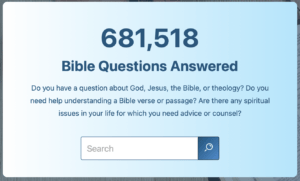Imagine you’re an adult Bible study teacher in a local church, a layperson without access to personal theological library. Imagine it’s a Saturday afternoon and you’re working on a lesson and need help, so you turn to the largest library available at your fingertips — the internet.
Type in a query — for example, who is the “man of lawlessness” in 2 Thessalonians 2? — and your screen will quickly fill with lots of website links. Typically, nine out of 10 of those links will be to very conservative, often Calvinist-oriented websites.
If you’re looking for moderate to progressive theological views, you’ll have to dig deeper, and even then you may not find any. The reality of the moment is that Christian conservatives, and particularly Calvinists, have cornered the market on free internet Bible helps. And that has implications for how lay leaders and even some pastors shape their teaching all across Christianity.
Hello, SEO
But why is it this way?
The answer is multi-layered, but it begins with something called Search Engine Optimization. This is an entire industry to itself that focuses on helping content providers get their links to show up high on the list of Google search results. (Full disclosure: BNG uses an SEO manager to help promote our content, too.)

(123rf.com)
SEO managers use keywords — embedded language that search engines look for to answer your questions quickly — to help push their clients toward the top of the search results. Most of the time, if you don’t show up in the top 10 Google results, your content will not be accessed. Certainly, you want to be in the top 20.
There are other ways to boost your ranking with paid promotions, too, but the main thing the search bots are looking for is relevance. That includes how frequently content has been accessed, how much other readers have interacted with it, how many links to other sources it includes, and how many relevant words are found within it.
Christian conservatives have worked hard to position their content for easy access online; moderate and progressive Christians have not. There are economic and institutional reasons why this is so, but the reality is that content has to be visible on the internet in order to be found on the internet.
The dominant players
Groups such as The Gospel Coalition, Desiring God and Got Questions, as well as individual pastors such as John MacArthur are big players in internet content. They have produced a lot of content that is available for free online, and as a result, their content shows up high in most searches. They also promote their content heavily among their followers, which has the flywheel effect of making their content show up higher in search results.
The Gospel Coalition, also known as TGC for short, is a major player in this market. It describes itself as “a fellowship of evangelical churches in the Reformed tradition deeply committed to renewing our faith in the gospel of Christ and to reforming our ministry practices to conform fully to the Scriptures.” TGC’s website offers a rich array of editorial content, Bible helps, videos, sermons and more. All for free.
 Another big player is Got Questions, which describes its mission as seeking “to glorify the Lord Jesus Christ by providing biblical, applicable and timely answers to spiritually related questions through an internet presence.” It continues: “We are Christian, Protestant, evangelical, theologically conservative and non-denominational. We view ourselves as a para-church ministry, coming alongside the church to help people find answers to their spiritually related questions.”
Another big player is Got Questions, which describes its mission as seeking “to glorify the Lord Jesus Christ by providing biblical, applicable and timely answers to spiritually related questions through an internet presence.” It continues: “We are Christian, Protestant, evangelical, theologically conservative and non-denominational. We view ourselves as a para-church ministry, coming alongside the church to help people find answers to their spiritually related questions.”
The Got Questions website says its staff have answered 681,518 Bible questions — all searchable online. For free.
In addition, internet searches for Bible helps often turn up sites that specialize in providing various translations of the Bible, sometimes with links to interpretive materials. A number of sites, such as Bible Hub and Bible Gateway, offer this content. Because of copyright laws, most of the commentaries available at such sites come from older works that are in the common domain.
It’s not that conservatives are the only ones producing Bible studies and online Bible helps; it’s just that they are better at making these resources available online for free.
The state of the Christian publishing industry
And that takes us to the Christian publishing industry — which has been in an economic freefall for a couple of decades.

(123rf.com)
Most Christian publishers need to sell their products, not give them away for free online. They want to sell you their curriculum, their books, their videos. They must sell you their content because that’s the only way they can survive. So even when their content shows up online, it most often is behind a paywall.
That means two important things: Their pay-to-view content doesn’t show up as frequently in search results, and fewer people access their content, which also lowers their rankings in search results.
This online reality mirrors what already was true in the Christian curriculum publishing business. Simply stated, conservative churches have been more likely to use a common curriculum for small-group Bible studies, while more progressive churches — if they offer small-group Bible studies — are more likely to opt for a buffet approach where individual classes or teachers choose their own material.
And as with everything else, the pandemic has changed the curriculum market — but for the worse. Even traditional curriculum publishers like the Southern Baptists’ Lifeway Christian Resources — a powerhouse in the business — have seen sales drop precipitously. And Lifeway quickly moved to offering more online content, more downloadable content, more free content. Lifeway also lost millions of dollars in 2020.
Smaller publishers — even smaller denominational publishers — also have struggled to adapt to the pandemic, as many Bible study classes stopped meeting in person or changed their approach to learning.
One veteran’s view
David Cassady has spent most of his career in the Christian publishing business. He’s now president of Baptist Seminary of Kentucky, where he’s engaging the academic side but still with an eye on serving local congregations.

David Cassady
“My doctorate focused on curriculum development, and I have been part of just about every curriculum resource developed in our moderate Baptist pond over the last 30 years,” he explained. And he loves to talk about this: “How to provide quality resources that appreciate scholarship and speak to progressive faith values.”
Cassady was the first employee hired by Smyth & Helwys when it began producing curriculum for moderate Baptist churches in 1992, and he worked there 15 years. He remains engaged with curriculum published by Good Faith Media and in a progressive online resource called Faithelement, produced by Faithlab. This is fresh content for church leaders published online every week — what Cassady calls an “unapologetically progressive theological resource, aimed at local church groups, that values scholarship.”
“It’s behind a paywall, because the audience is too small to do an ad-supported approach (trust me, I’ve tried),” Cassady explained. “It follows the Lectionary and uses various forms of media to make it easier for leaders to provide better quality content and process.”
But the business operates on a shoestring.
The same is no doubt true of other online publishers of moderate to progressive content.
“How congregations do education is likely key to whether we can make progress around women in ministry, racial justice issues, Christian nationalism, misinformation, cultural relevancy and the overall dysfunction haunting many congregations today.”
“Adult Christian education has been much more present in evangelical churches, who tend to be more conservative,” Cassady said. For example, congregations in the Presbyterian Churches USA, United Methodist Church and Disciples of Christ “are not known for having much in the way of adult education in their programming,” he added. “This leads to insufficient demand among more progressive audiences for such resources.”
And in the world of Cooperative Baptist Fellowship and Alliance of Baptists congregations — heirs of a more robust adult education tradition from the Southern Baptist Convention — “education has been left to individual teachers to guide,” Cassady noted. “While many mean well, the truth is that the seminary-trained staff are in a much better position to evaluate educational resources and content but are loathe to do so. The polarization that has swept through our culture means that disagreements over content/resources turn into ideological battles, and I suspect it’s just not worth it.”
Anyone who’s ever tried to market anything to local congregations — whether curriculum or supplies or partnerships — knows there are gatekeepers involved. The first gatekeeper typically is whoever sits in the church office and receives general mail and email. Then there are pastors and other staff members who have their own interests.
Thus, an already small market for curriculum and Bible study resources also is hard to crack.
As difficult as this task is, there are real-world implications for what gets taught in a church’s small-group Bible studies, just as from the pulpit.
“How congregations do education is likely key to whether we can make progress around women in ministry, racial justice issues, Christian nationalism, misinformation, cultural relevancy and the overall dysfunction haunting many congregations today,” Cassady said.
Related articles:
Church curriculum publishers experience reduced sales due to COVID
Brentwood Benson Music announces sudden closing and the end of an era
Lifeway’s new headquarters is much smaller, designed for collaboration, not offices


